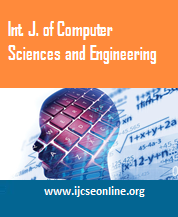Call for Paper
IJCSE solicits original or unpublished research papers/articles, review articles, and survey papers to our upcoming Edition issue.
Authors are cordially invited to submit their original or unpublished, experimental, theoretical research paper through the Online Submission procedure available at our website. It is a step easy and fast process of submission which will give rapid processing to your submitted articles. To submit the manuscript through the online procedure, please register yourself by filling a simple registration form and enjoy the benefits of our services.
All the submitted papers are first reviewed at the editorial board level and assessed on the basis of their technical suitability for the journal, scope of work, and plagiarism. If selected by the editorial board, the paper shall be subjected to a fair and unbiased double-blind peer review by at least two referees on the basis of their originality, novelty, clarity, completeness, relevance, significance and research contribution. The review process may take 02 to 4 weeks depending upon the cycles of review required before the paper is finally accepted. Please refer to Authors Guidelines for details of the reviewing process and to submit your papers please refer to the Online Submission System.
Article/Paper Acceptance Requirements
- The article is presented in an intelligible fashion and is written in IJCSE Template.
- The article should be original writing that enhances the existing body of knowledge in the given subject area. Original review articles and surveys are acceptable, even if new data/concepts are not presented.
- Results reported have not been submitted or published elsewhere (although expanded versions of conference publications are eligible for submission).
- Experiments, statistics, and other analyses are performed to a high standard and are described in sufficient detail.
- Conclusions are presented in an appropriate fashion and are supported by the data.
- Figure/Image should be showing clearly and clearly mention figure name and numbers in increasing order.
- Equation/Formula should be in Math’s equation Software or word Equestion.
- Please do not give a scanned copy of the equation/formula.
- The tables should be in MS Word. Please do not give a scanned copy of the tables.
- Appropriate references to related prior published works must be included in IJCSE Standard.
- All the references should be mentioned inside the paragraph in IJCSE/IEEE format. References must be serially numbered and should be arranged in increasing order of number quoted in the text. References must be quoted in the text as numerals at the end of the sentence, before full stop, with bracket e.g. .......solution [1]. It is an international journal [2],[3],[4],[5],[6]. ………, [N] that is increasing order. You have started references form [9],[1],[2],[3],[4],[7],[4],[5],[6] this is not correct.
- Websites URL and invalid/incomplete references/citations replaced by the references of the Journal or remove from the reference section.
Common Reasons for Rejection
Technical reasons for rejection include:
- Incomplete data such as too small a sample size or missing or poor controls
- Poor analysis such as using inappropriate statistical tests or a lack of statistics altogether
- Inappropriate methodology for answering your hypothesis or using the old methodology that has been surpassed by newer, more powerful methods that provide more robust results
- Weak research motive where your hypothesis is not clear or scientifically valid or your data does not answer the question posed
- Inaccurate conclusions on assumptions that are not supported by your data
Editorial reasons for rejection include:
- Out of scope for the journal
- Not enough of an advance or of enough impact for the journal
- Research ethics ignored such as consent from patients or approval from an ethics committee for animal research
- Lack of proper structure or not following journal formatting requirements
- Lack of the necessary detail for readers to fully understand and repeat the authors` analysis and experiments
- Lack of up-to-date references or references containing a high proportion of self-citations
- Has poor language quality such that it cannot be understood by readers
- Difficult to follow logic or poorly presented data.
- Violation of publication ethics


